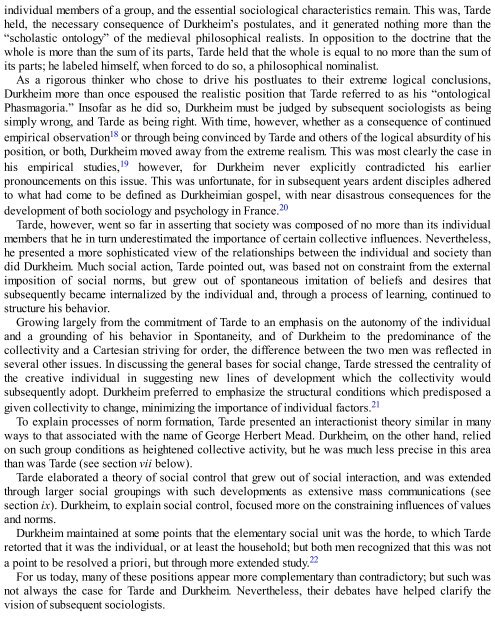3658925934
You also want an ePaper? Increase the reach of your titles
YUMPU automatically turns print PDFs into web optimized ePapers that Google loves.
individual members of a group, and the essential sociological characteristics remain. This was, Tarde<br />
held, the necessary consequence of Durkheim’s postulates, and it generated nothing more than the<br />
“scholastic ontology” of the medieval philosophical realists. In opposition to the doctrine that the<br />
whole is more than the sum of its parts, Tarde held that the whole is equal to no more than the sum of<br />
its parts; he labeled himself, when forced to do so, a philosophical nominalist.<br />
As a rigorous thinker who chose to drive his postluates to their extreme logical conclusions,<br />
Durkheim more than once espoused the realistic position that Tarde referred to as his “ontological<br />
Phasmagoria.” Insofar as he did so, Durkheim must be judged by subsequent sociologists as being<br />
simply wrong, and Tarde as being right. With time, however, whether as a consequence of continued<br />
empirical observation 18 or through being convinced by Tarde and others of the logical absurdity of his<br />
position, or both, Durkheim moved away from the extreme realism. This was most clearly the case in<br />
his empirical studies, 19 however, for Durkheim never explicitly contradicted his earlier<br />
pronouncements on this issue. This was unfortunate, for in subsequent years ardent disciples adhered<br />
to what had come to be defined as Durkheimian gospel, with near disastrous consequences for the<br />
development of both sociology and psychology in France. 20<br />
Tarde, however, went so far in asserting that society was composed of no more than its individual<br />
members that he in turn underestimated the importance of certain collective influences. Nevertheless,<br />
he presented a more sophisticated view of the relationships between the individual and society than<br />
did Durkheim. Much social action, Tarde pointed out, was based not on constraint from the external<br />
imposition of social norms, but grew out of spontaneous imitation of beliefs and desires that<br />
subsequently became internalized by the individual and, through a process of learning, continued to<br />
structure his behavior.<br />
Growing largely from the commitment of Tarde to an emphasis on the autonomy of the individual<br />
and a grounding of his behavior in Spontaneity, and of Durkheim to the predominance of the<br />
collectivity and a Cartesian striving for order, the difference between the two men was reflected in<br />
several other issues. In discussing the general bases for social change, Tarde stressed the centrality of<br />
the creative individual in suggesting new lines of development which the collectivity would<br />
subsequently adopt. Durkheim preferred to emphasize the structural conditions which predisposed a<br />
given collectivity to change, minimizing the importance of individual factors. 21<br />
To explain processes of norm formation, Tarde presented an interactionist theory similar in many<br />
ways to that associated with the name of George Herbert Mead. Durkheim, on the other hand, relied<br />
on such group conditions as heightened collective activity, but he was much less precise in this area<br />
than was Tarde (see section vii below).<br />
Tarde elaborated a theory of social control that grew out of social interaction, and was extended<br />
through larger social groupings with such developments as extensive mass communications (see<br />
section ix). Durkheim, to explain social control, focused more on the constraining influences of values<br />
and norms.<br />
Durkheim maintained at some points that the elementary social unit was the horde, to which Tarde<br />
retorted that it was the individual, or at least the household; but both men recognized that this was not<br />
a point to be resolved a priori, but through more extended study. 22<br />
For us today, many of these positions appear more complementary than contradictory; but such was<br />
not always the case for Tarde and Durkheim. Nevertheless, their debates have helped clarify the<br />
vision of subsequent sociologists.









![Genki - An Integrated Course in Elementary Japanese II [Second Edition] (2011), WITH PDF BOOKMARKS!](https://img.yumpu.com/58322134/1/180x260/genki-an-integrated-course-in-elementary-japanese-ii-second-edition-2011-with-pdf-bookmarks.jpg?quality=85)
![Genki - An Integrated Course in Elementary Japanese I [Second Edition] (2011), WITH PDF BOOKMARKS!](https://img.yumpu.com/58322120/1/182x260/genki-an-integrated-course-in-elementary-japanese-i-second-edition-2011-with-pdf-bookmarks.jpg?quality=85)





